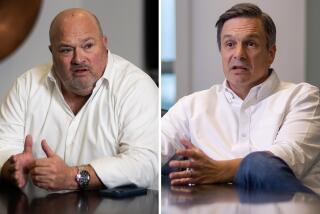Robert G. Hoyt, 81; Founder of the National Catholic Reporter
- Share via
Robert G. Hoyt, founder of the National Catholic Reporter, an independent weekly newspaper that applies the critical standards of secular journalism to the religious press, has died. He was 81.
Hoyt, who had a history of heart trouble, died April 10 of a heart attack in Lenox Hill Hospital in New York City.
During his six years as editor of the Reporter, from 1964 to 1970, Hoyt broke with tradition in a number of ways. Then as now, most Roman Catholic newspapers were owned by the church and supervised by the local bishop, or cardinal in cities such as Los Angeles where there is a cardinal in residence.
As editor of the Catholic newspaper in Kansas City-St. Joseph, Mo., Hoyt moved the news coverage beyond photogenic updates of church doings. The paper’s reputation grew, subscriptions from outside the area increased and Hoyt became convinced that there was an audience for a national publication with a professional approach to reporting and editorializing.
He launched the Reporter during the Second Vatican Council in the early 1960s, the international gathering of lay Catholics and priests that revised a wide range of church positions. Among the revisions was a call for greater participation by the laity in decision making.
“Our slogan was, ‘Published by and for the people,’ ” Hoyt told National Public Radio in 2002. “It underlined the idea that our client was the reader, not the institutional church, not the Pope.”
“Those were the heady days of Vatican II,” recalled Martin Marty, a religion historian and Lutheran minister who was among the first columnists for the newspaper. He covered interdenominational issues. “From the beginning, the paper tested the status quo. It picked themes that were in dialogue with the secular press. Civil rights, antiwar issues, the nuclear arms race.”
Hoyt’s first run-in with church officials came in 1968 when he published recommendations made by a Papal Birth Control Commission. Pope Paul VI had appointed the group, made up of medical experts, theologians and ethicists in a mix of lay Catholics and priests. “They concluded that church teaching ought to be changed,” said Tom Roberts, current editor of the Reporter. “The Pope’s Vatican advisors argued against the commission’s recommendations.” The advisors’ report became the official church statement.
Missouri Bishop Charles Helmsing blessed the feisty newspaper when it was new, but blasted editors for reprinting the birth control commission’s report. He accused them of fostering heresy and scandal and threatened to excommunicate them.
Hoyt published Helmsing’s pastoral pronouncement in the paper.
“Everything Bob did was very stormy,” Marty said. “He was irascible. Constantly churning.”
Roberts, the paper’s editor since 2001, said that subscribers have always been primarily progressive Catholics. Circulation is now around 50,000, he said.
From the beginning, there were articles that even liberal readers found unsettling. Lucid, well-argued columns ran beside letters to the editor filled with choked phrases of rage.
“Hoyt gave us our intellectual DNA,” said Roberts. “He set a standard for covering a denomination the way we would cover other institutions.”
More recently, in 1985, the Reporter broke a national story about a Philadelphia priest accused of being a child molester. Coverage included estimates on the scope of the problem among clergymen that have since proved realistic.
National publications for Catholics such as the independently owned Commonweal magazine and America magazine, published by the Jesuits, have existed for decades. But, said Roberts, “None did investigative reporting when Hoyt founded the National Catholic Reporter.”
Hoyt was born in Clinton, Iowa, in 1922 and educated in Catholic schools, including St. Norbert College in De Pere, Wis., a preparatory school for the priesthood. He entered the Norbertine order for priests and brothers, but left in 1942.
Four years later, he began his journalism career in Denver at the National Register, a diocesan newspaper, where he met Bernadette Lyon. They married in 1948 and had six children before they divorced in 1970.
In 1950, the couple helped to found the Sun Herald, a Catholic daily newspaper published in Kansas City, Mo., that lasted six months. Hoyt was named editor of the local diocesan paper, the Catholic Reporter, in 1957. From there he launched the National Catholic Reporter.
He left the Reporter in 1970 partly because of falling circulation and financial problems. “We saw Bob Hoyt’s spending habits as lavish,” said Marty, who was on the board of directors. “He had wonderful vision, but he wasn’t so good at some practical things.”
He worked to support antiwar presidential candidates -- Eugene McCarthy in 1968 and George McGovern in 1972 -- and was named editor of Christianity & Crisis, an ecumenical journal, several years later. He became a senior writer for Commonweal in 1989 and remained there until last year.
Hoyt is survived by his wife, Mig Boyle, their daughter Sarah, and the six children from his first marriage, Michael, Timothy, Mary Teresa, James, Mary Jo and Ann.
More to Read
Sign up for Essential California
The most important California stories and recommendations in your inbox every morning.
You may occasionally receive promotional content from the Los Angeles Times.













